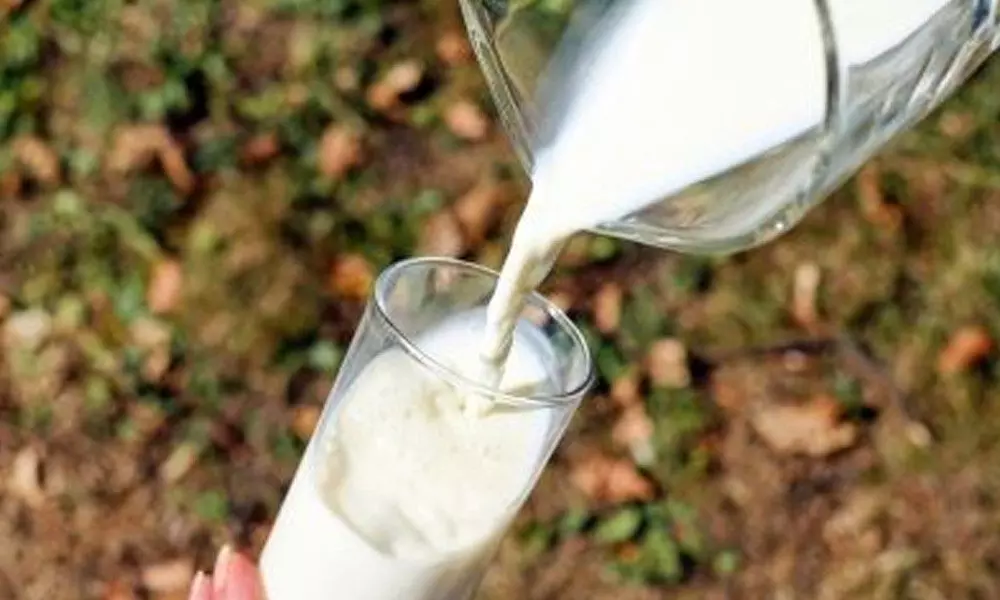Live
- Inter exam fee last date extended
- Outrage as stray dogs poisoned in Sullurpeta
- Hyderabad soaks in vibrant Yuletide spirit
- Heavy rains forecast at isolated places in AP
- Paediatricians raise alarm over spread of HFMD in Prakasam
- Cong demands Shah’s expulsion
- One-man panel to visit three districts from Dec 27
- Monitor investments, creation of jobs: CS
- Hyderabad: City-based Karaoke group feted by Rafi family
- Rachakonda sees uptick in murders, kidnappings; overall crime rate rises
Just In
PETA India advises Amul to switch to creamy dairy-free milk


PETA India advises Amul to switch to creamy dairy-free milk
Concerning demand for vegan food and beverages, PETA India called on Amul, an Indian dairy cooperative society, to realise which way the wind is blowing and switch to producing the creamy dairy-free milk that today's consumers want
Concerning demand for vegan food and beverages, PETA India called on Amul, an Indian dairy cooperative society, to realise which way the wind is blowing and switch to producing the creamy dairy-free milk that today's consumers want.
In the letter to Amul Managing Director R.S. Sodhi, People for the Ethical Treatment of Animals (PETA) India said "we would again like to encourage Amul to benefit from the booming vegan food and milk market, instead of wasting resources trying to fight the demand for plant-based products that is only growing. Other companies are responding to market changes, and Amul can, too".
Pointing out that the demand for vegan food and beverages is so great that a report by Grand View Research revealed that the global dairy alternatives market is estimated to reach $52.58 billion by 2028, PETA India Vegan Outreach Coordinator Dr Kiran Ahuja said: "Much of the world - and that certainly includes India - has turned sour towards dairy over animal welfare, environmental, and health concerns."
"PETA India is calling on Amul to realise which way the wind is blowing and switch to producing the creamy dairy-free milk that today's consumers want."
In India, most people would be astonished to learn that the dairy sector is the primary supplier of cattle to the beef industry and that most family farms are now gone, PETA India said.
Today, the group said, most cows and buffaloes used for dairy are raised in a factory environment and artificially inseminated and their calves are typically stolen from them shortly after birth so that the milk nature intended for them to drink can be consumed by humans instead.
"You've seen them on the street: male calves who are of no value to the dairy business, cast out to starve. Others are sold to be killed for their flesh and skin, while females are sentenced to the same fate as their mothers: they're used as milk machines until their bodies give out, at which point many are abandoned or slaughtered for cheap meat."
Such is the dairy industry's panic that the National Cooperative Dairy Federation of India has made a plea in the High Court of Delhi that only animal milk be permitted to be called "milk", PETA India said.
However, in a 2018 article, the Smithsonian Magazine explains that referring to plant-based milks as milk, such as coconut milk, dates back centuries and is consistent across countries. In vernacular terminology, it is referred to as badam ka doodh and nariyal ka doodh.
PETA India - whose motto reads, in part, that "animals are not ours to eat" and which opposes a human-supremacist world view - notes that major dairy companies around the world - including Nestle, Epigamia, Chobani, Danone, and Yoplait - are now investing in non-dairy options.
It also said analysts at the British financial services company Barclays predict that the vegan food and drink market could increase by more than 1,000 per cent by the end of the decade, and a 2019 article on a website run by Franchise India Holdings Limited found that the number of vegans in India has risen by 360 per cent in the past decade.

© 2024 Hyderabad Media House Limited/The Hans India. All rights reserved. Powered by hocalwire.com






